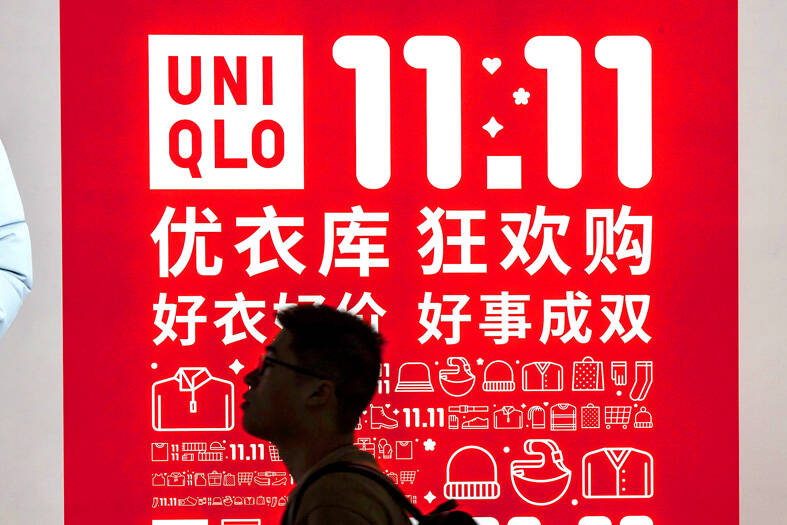Merchants and consumers alike found the Singles’ Day shopping festival Monday less shiny than in years past as e-commerce firms look abroad for growth.
The annual event, named after the numeric form of its Nov. 11 date, was started in 2009 by e-commerce platform Alibaba Group Holding Ltd (阿里巴巴), which offered attractive discounts to entice shoppers to spend big. The extravaganza has since expanded to other platforms, such as JD.com Inc (京東) and Pinduoduo Inc (拼多多), as well as abroad.
While Singles’ Day was previously a one-day event, shopping platforms in China now begin the festival weeks ahead to drum up sales volume. It has also traditionally been regarded as a barometer of consumer sentiment.

Photo: Qilai Shen, Bloomberg
However, consumers no longer go all out on purchases during the shopping extravaganza amid China’s lagging domestic economy, dragged down by a real-estate crisis and deflationary pressures.
“I only spent a few hundred yuan on daily necessities,” said Wang Haihua, who owns a fitness center in Beijing.
The prices on e-commerce platforms during Singles’ Day are not necessarily cheaper than usual, Wang said.
“They are all tricks and we have seen through it over the years,” she said.
Zhang Jiewei, a 34-year-old who runs a barber shop in Xi’an, said that he no longer trusted Singles’ Day promotions, as some merchants tend to raise the usual price of a product before offering a discount, giving consumers the illusion they are getting a deal.
“I am not going to buy anything this year,” he said.
Some experts say that Beijing’s recent stimulus measures have had little impact to boost consumer confidence.
“People are not interested in spending and are cutting back on big-ticket items,” China Market Research Group founder and managing director Shaun Rein said. “Since October 2022, the weak economy means that everything has been on discount year-round, 11.11 is not going to bring in more discounts than the month before.”
Rein said he expects low growth for the Singles’ Day shopping festival, as consumers tighten their spending in anticipation of difficult economic times ahead.
However, categories such as sportswear and fitness have been doing well as customers “trade down a Gucci bag for Lululemon sportswear,” he said.
Platforms such as JD.com and Alibaba, which operates e-commerce platforms Taobao (淘寶) and Tmall (天貓), used to publish the value of transactions made during the festival, but have stopped revealing the total figure. While yearly growth used to be in the double digits, estimates of recent figures have dwindled to low, single-digit growth.
Data provider Syntun (星圖數據) estimated that last year’s gross merchandising volume sales across major e-commerce platforms grew just 2 percent to 1.14 trillion yuan (US$158.46 billion), a far cry from double-digit growth before the COVID-19 pandemic.
Merchants who typically take part in the Singles’ Day shopping festival say the costs of participation no longer pay off, amid high advertising fees and unsatisfactory sales.
Meanwhile, e-commerce platforms grappling with a slowing domestic market have also turned to overseas markets to seek new growth, offering promotions such as global free shipping and allowing merchants to sell globally with ease.
For example, Alibaba in a blog post on its Alizila site said that about 70,000 merchants saw sales double with global free shipping.
In markets such as Singapore and Hong Kong, new customers also doubled, it added.

Application-specific integrated circuit designer Faraday Technology Corp (智原) yesterday said that although revenue this quarter would decline 30 percent from last quarter, it retained its full-year forecast of revenue growth of 100 percent. The company attributed the quarterly drop to a slowdown in customers’ production of chips using Faraday’s advanced packaging technology. The company is still confident about its revenue growth this year, given its strong “design-win” — or the projects it won to help customers design their chips, Faraday president Steve Wang (王國雍) told an online earnings conference. “The design-win this year is better than we expected. We believe we will win

Intel Corp chief executive officer Lip-Bu Tan (陳立武) is expected to meet with Taiwanese suppliers next month in conjunction with the opening of the Computex Taipei trade show, supply chain sources said on Monday. The visit, the first for Tan to Taiwan since assuming his new post last month, would be aimed at enhancing Intel’s ties with suppliers in Taiwan as he attempts to help turn around the struggling US chipmaker, the sources said. Tan is to hold a banquet to celebrate Intel’s 40-year presence in Taiwan before Computex opens on May 20 and invite dozens of Taiwanese suppliers to exchange views

Chizuko Kimura has become the first female sushi chef in the world to win a Michelin star, fulfilling a promise she made to her dying husband to continue his legacy. The 54-year-old Japanese chef regained the Michelin star her late husband, Shunei Kimura, won three years ago for their Sushi Shunei restaurant in Paris. For Shunei Kimura, the star was a dream come true. However, the joy was short-lived. He died from cancer just three months later in June 2022. He was 65. The following year, the restaurant in the heart of Montmartre lost its star rating. Chizuko Kimura insisted that the new star is still down

While China’s leaders use their economic and political might to fight US President Donald Trump’s trade war “to the end,” its army of social media soldiers are embarking on a more humorous campaign online. Trump’s tariff blitz has seen Washington and Beijing impose eye-watering duties on imports from the other, fanning a standoff between the economic superpowers that has sparked global recession fears and sent markets into a tailspin. Trump says his policy is a response to years of being “ripped off” by other countries and aims to bring manufacturing to the US, forcing companies to employ US workers. However, China’s online warriors